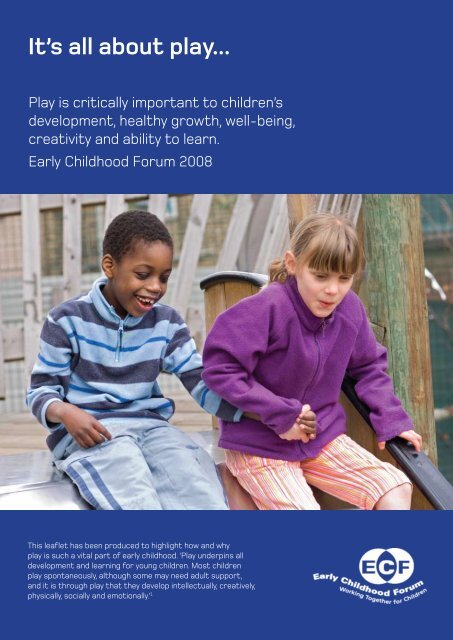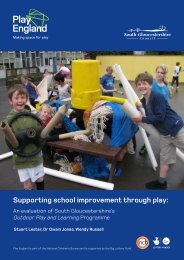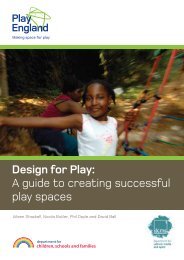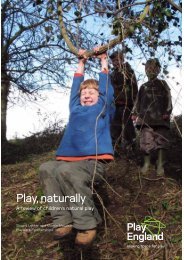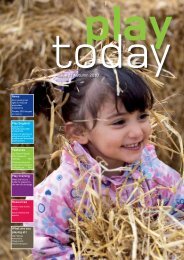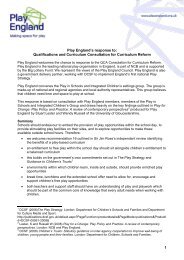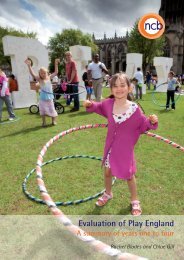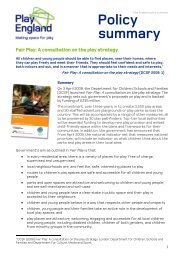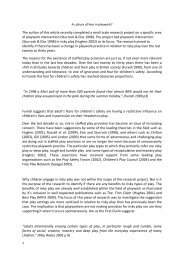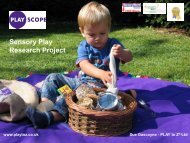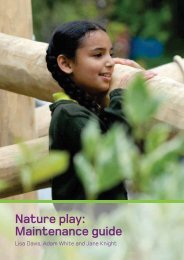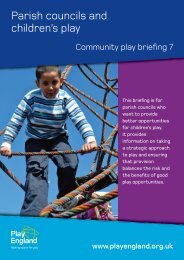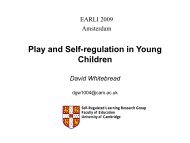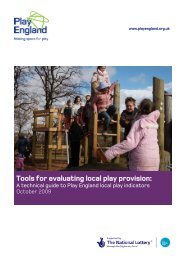It's all about play...
It's all about play...
It's all about play...
You also want an ePaper? Increase the reach of your titles
YUMPU automatically turns print PDFs into web optimized ePapers that Google loves.
It’s <strong>all</strong> <strong>about</strong> <strong>play</strong>...<br />
Play is critic<strong>all</strong>y important to children’s<br />
development, healthy growth, well-being,<br />
creativity and ability to learn.<br />
Early Childhood Forum 2008<br />
This leaflet has been produced to highlight how and why<br />
<strong>play</strong> is such a vital part of early childhood. ‘Play underpins <strong>all</strong><br />
development and learning for young children. Most children<br />
<strong>play</strong> spontaneously, although some may need adult support,<br />
and it is through <strong>play</strong> that they develop intellectu<strong>all</strong>y, creatively,<br />
physic<strong>all</strong>y, soci<strong>all</strong>y and emotion<strong>all</strong>y.’ 1
Children’s right to <strong>play</strong><br />
The right to <strong>play</strong> and informal recreation, for <strong>all</strong> children<br />
and young people up to 18 years of age, is enshrined in<br />
Article 31 of the UN Convention on the Rights of the<br />
Child, ratified by the UK government in 1991. 2 Therefore,<br />
government has a duty to protect and promote <strong>play</strong><br />
opportunities for children and young people of <strong>all</strong><br />
ages, interests and abilities. Likewise, parents have a<br />
responsibility to ensure <strong>play</strong> is an integral part of their<br />
children’s childhood. All those who work with children<br />
need to provide a diverse range of <strong>play</strong> activities, which<br />
support children’s development.<br />
Charter for Children’s Play<br />
The Early Childhood Forum (ECF) welcomes the Charter<br />
for Children’s Play 3 , which sets out a vision for <strong>play</strong>.<br />
We hope the charter will act as a catalyst to ensure<br />
that everyone in the children’s workforce, parents<br />
and communities take responsibility for addressing<br />
children’s needs for <strong>play</strong> and informal recreation.<br />
Children can develop and learn through <strong>play</strong><br />
Play is part of development and learning, and viceversa.<br />
Freely chosen <strong>play</strong> is important and is fun in its<br />
own right. It is how children enjoy themselves, each<br />
other and their families.<br />
Children, disabled and non-disabled, whatever<br />
their age, culture, ethnicity or social and economic<br />
background need and want to <strong>play</strong>. Children choose<br />
how and what they <strong>play</strong> and they <strong>play</strong> because it is<br />
satisfying. Children <strong>play</strong> from birth and throughout<br />
their lives. For babies and toddlers, <strong>play</strong> is an important<br />
part of developing attachments with the external<br />
world, particularly with mothers, fathers, carers and<br />
the wider family. Through activities such as nursery<br />
rhymes, peek-a-boo, songs, hand and finger games,<br />
young children and adults learn how to interact and<br />
relate to one other. As they grow and develop, children<br />
and young people carry on exploring the world<br />
through <strong>play</strong>, developing soci<strong>all</strong>y and emotion<strong>all</strong>y,<br />
testing out ideas and reflecting on the world<br />
around them.<br />
Early Years Foundation Stage<br />
The Early Years Foundation Stage (EYFS)<br />
provides a strong<br />
foundation for young<br />
children’s development<br />
and emphasises the<br />
importance<br />
of learning<br />
through <strong>play</strong><br />
and also the<br />
role of <strong>play</strong> in its<br />
own right. The<br />
whole of the EYFS,<br />
which applies to childminders, early years settings,<br />
and nursery and reception years in schools, is now<br />
focused on learning through <strong>play</strong> and active learning.<br />
‘For the first time, the Early Years Foundation Stage<br />
brings together early learning and care, recognising<br />
that we need to support children’s development in<br />
the round and offer high quality <strong>play</strong>-based early<br />
learning that will <strong>all</strong>ow children to achieve their full<br />
potential.’ 4<br />
‘Play and exploration in early years settings means<br />
children are able to choose activities where they<br />
engage with other children or adults or sometimes<br />
<strong>play</strong> alone, and during those activities they learn<br />
through first-hand experience – by actively “doing”.<br />
They need sufficient space, time and choice with<br />
a range of activities, some of which have been<br />
planned and prepared by the practitioners on the<br />
basis of their observations of individual children’s<br />
current interests, learning styles and stages of<br />
development.’ 5<br />
Play helps keep children safe<br />
Risk-taking is an essential feature of <strong>play</strong> and of <strong>all</strong><br />
environments where children <strong>play</strong>. Children need the<br />
chance to encounter acceptable risks as part of a<br />
stimulating and ch<strong>all</strong>enging learning environment: ‘All<br />
children both need and want to take risks in order<br />
to explore limits, venture into new experiences and<br />
develop their capacities, from a very young age and<br />
from their earliest <strong>play</strong> experiences.’ 6<br />
Play is essential to children developing knowledge,<br />
understanding and experience of managing risk,<br />
which is crucial to help children stay safe: ‘…children<br />
need also to be able to learn, have new experiences<br />
and enjoy their childhoods, so we will help families<br />
strike the right balance between keeping children<br />
safe and <strong>all</strong>owing them the freedom they need’. 7<br />
If children learn <strong>about</strong> exploring and managing risk<br />
at a young age it will give them more confidence to<br />
continue to do this throughout their childhood. It will<br />
also help their parents become more confident that<br />
<strong>play</strong>, particularly outdoor <strong>play</strong>, is a crucial aspect of<br />
their children’s learning and development.<br />
Through <strong>play</strong>, children gain self-confidence,<br />
independence and resilience. They access essential<br />
information <strong>about</strong> themselves and the world around<br />
them. Play is vital for children’s social and emotional<br />
development. Playing outdoors, exploring their<br />
community and natural environment is essential<br />
to children’s health. ‘Good health is vital if children<br />
and young people are to enjoy their childhood and<br />
achieve their full potential. If we can establish good<br />
habits in childhood, this will provide the basis for<br />
lifelong health and wellbeing.’ 8
Children will <strong>play</strong><br />
everywhere and<br />
in <strong>all</strong> weathers,<br />
given the chance<br />
Adults supporting children’s <strong>play</strong><br />
Children need adults who understand that it is<br />
important to let them <strong>play</strong>, who know when to and when not<br />
to intervene, and who value children’s <strong>play</strong> in its own right<br />
because:<br />
• children have a natural inclination to <strong>play</strong><br />
• children engage in <strong>play</strong> for its own sake<br />
• children <strong>play</strong> everywhere.<br />
Children get most benefit when adults understand that<br />
<strong>play</strong> and active first hand experience is fundamental to<br />
their development. When children <strong>play</strong> they are engaging<br />
in a complex process that affects <strong>all</strong> aspects of their<br />
development. ‘The Early Years Foundation Stage expects<br />
<strong>all</strong> practitioners to meet the individual needs of <strong>all</strong> children<br />
in their care and to provide a diverse range of <strong>play</strong>-based<br />
activities tailored to support children’s development.’ 10<br />
Adults can support children’s <strong>play</strong> by:<br />
What happens when children <strong>play</strong>?<br />
Children of <strong>all</strong> ages <strong>play</strong> instinctively if given the time,<br />
space, opportunity and permission to do so. They also<br />
need time to stand and stare, to reflect and to ‘chill out’. 9<br />
Children learn through initiating <strong>play</strong> for themselves<br />
by choosing what they want to do, how they want to<br />
do it and when to stop and try something else.<br />
Children learn from social <strong>play</strong> where they can make<br />
up and use different rules with other children,<br />
develop friendships and take part in collaborative <strong>play</strong>.<br />
Children use physical <strong>play</strong> to enjoy movement for its<br />
own sake as well as set their own ch<strong>all</strong>enges and<br />
learn their own boundaries.<br />
Children like socio-dramatic <strong>play</strong> where they act out<br />
real and potential experiences such as <strong>play</strong>ing shops.<br />
They also often <strong>play</strong> out difficult situations over and<br />
over again.<br />
• having a <strong>play</strong>ful approach to <strong>play</strong> and planned activities<br />
• listening to children and valuing their contribution<br />
• providing opportunities for children to learn <strong>about</strong> risk<br />
and test boundaries<br />
• valuing friendships and children’s time with each other<br />
• ensuring children can <strong>play</strong> in spaces where children can<br />
initiate their own <strong>play</strong> activities and <strong>play</strong> on their own<br />
• building on children’s interests and what they enjoy<br />
doing natur<strong>all</strong>y<br />
• encouraging children to extend their range of experiences<br />
• talking with children <strong>about</strong> their <strong>play</strong>.<br />
About the Early Childhood Forum<br />
ECF is a coalition of 53 professional associations,<br />
voluntary organisations and interest groups united in<br />
their concern <strong>about</strong> the care and education of young<br />
children from birth to eight.<br />
Part funded by the Department for Children, Schools<br />
and Families (DCSF), it aims to bring together partners<br />
in the early childhood sector to debate issues, celebrate<br />
differences and develop consensus to champion quality<br />
experiences for <strong>all</strong> young children from birth to eight<br />
and their families. It promotes inclusion and ch<strong>all</strong>enges<br />
inequalities.<br />
See www.ncb.org.uk/ecf for more information.<br />
Children enjoy rough and tumble <strong>play</strong> that involves<br />
touching, tickling, gauging relative strength,<br />
discovering physical flexibility and having fun.<br />
Children learn through fantasy <strong>play</strong> where they <strong>play</strong><br />
out situations that are unlikely to happen in real life<br />
or <strong>play</strong> out real life through fantasy.
Early Childhood Forum<br />
National Children’s Bureau<br />
8 Wakley Street<br />
London<br />
EC1V 7QE<br />
Tel: 020 7843 6078<br />
Email ecf@ncb.org.uk<br />
www.ncb.org.uk/ecf<br />
Published by National Children’s Bureau 2008<br />
Registered charity number 258825<br />
Editor: Dwynwen Stepien (Early Childhood Unit)<br />
April 2008<br />
References<br />
1<br />
DfES (2007a) Early Years Foundation Stage:<br />
Practice Guidance. London: Department for<br />
Education and Skills/The Stationery Office.<br />
2<br />
In the charter, children are defined as anyone<br />
under the age of 18 years. This definition draws<br />
on that used in the United Nations Convention<br />
on the Rights of the Child and ratified by the<br />
United Kingdom in 1991.<br />
3<br />
Play England (2007) Charter for Children’s Play.<br />
London: Play England.<br />
4<br />
DCSF (2007) The Children’s Plan: Building<br />
brighter futures. London: Department for<br />
Children, Schools and Families.<br />
5<br />
DfES (2007b) Early Years Foundation Stage<br />
Effective Practice: Play and Exploration. London:<br />
Department for Education and Skills/The<br />
Stationery Office.<br />
6<br />
Play Safety Forum (2002): Managing Risk in Play<br />
Provision London: Children’s Play Council.<br />
7<br />
See endnote 4.<br />
8<br />
See endnote 4.<br />
9<br />
Adapted from Hughes, B (2002) A Playworkers<br />
Taxonomy of Play Types. London: Playlink<br />
10<br />
See endnote 4.<br />
Photos courtesy of Play England and Steiner<br />
Waldorf Schools Fellowship.<br />
Play England is part of the National Children’s<br />
Bureau and is supported by the Big Lottery Fund.<br />
www.<strong>play</strong>england.org.uk


